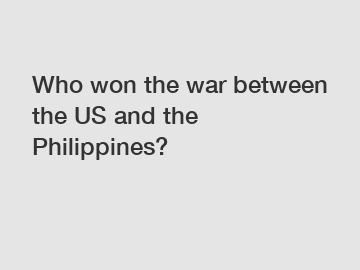Who won the war between the US and the Philippines?
Who Won the War Between the US and the Philippines?
The conflict between the United States and the Philippines, known as the Philippine-American War, was a significant event in the early 20th century. Spanning from 1899 to 1902, this war resulted in profound socio-political changes in the Philippines. The question of who emerged as the ultimate winner from this conflict is complex, as it requires analyzing various aspects of the war and its aftermath. In this article, we will examine the different perspectives and consequences of the war to shed light on the ultimate victor.
Background.

The Philippine-American War began after the Philippines declared independence from Spain, following the Treaty of Paris in 1898, which ended the Spanish-American War. However, the United States, now in control of the Philippines, sought to establish its own colonial rule and suppress the Filipino independence movement. This ignited a brutal armed conflict between the American forces and Filipino revolutionaries, led by Emilio Aguinaldo.
H2: American Superiority and Military Victory.
From a military standpoint, the United States emerged as the victor in the Philippine-American War. The American forces, equipped with superior weapons and resources, quickly gained the upper hand against the Filipino revolutionaries. The US Army implemented new military strategies and employed tactics such as a strong focus on modern warfare techniques and control of key areas, enabling them to suppress the Filipino resistance. Although the war lasted for three years, the American military was ultimately successful in quelling the Filipino revolutionaries and asserting control over the archipelago.
H2: Compromised Political Independence.
While the United States claimed military victory, the Philippines' political independence was compromised. The war resulted in the colonization of the Philippines by the United States, essentially trading one imperial power for another. The United States established a colonial government in the Philippines, which aimed to transform the country into a democratic territory under American rule. This colonization severely undermined the goals of the Philippine revolutionaries who had fought for true independence and self-governance.
H2: Lingering Effects and National Identity.
The Philippine-American War had a lasting impact on the national identity and consciousness of the Filipino people. Despite the colonization by the United States, the war ignited a sense of nationalism and resistance against foreign occupation. The war heroes and leaders, such as General Gregorio del Pilar and Apolinario Mabini, became symbols of national pride and exemplified the resilience of the Filipino people. The war also sparked the development of cultural and artistic movements that aimed to preserve and celebrate Filipino heritage and traditions.
Conclusion.
Determining a clear winner in the war between the US and the Philippines is not a straightforward task. While the United States achieved military victory and established its colonial rule, the Filipino revolutionaries fought for independence and national identity. The war's consequences shaped the course of Philippine history and brought about significant socio-political changes. Ultimately, the Filipino people persevered, and the struggle for independence continued until the Philippines gained sovereignty in 1946.
If you have any further questions or would like to learn more about the Philippine-American War, please do not hesitate to contact us.
If you are looking for more details, kindly visit precision metal film resistors, wholesale power resistor, metal film resistors.
40
0
0

Comments
All Comments (0)